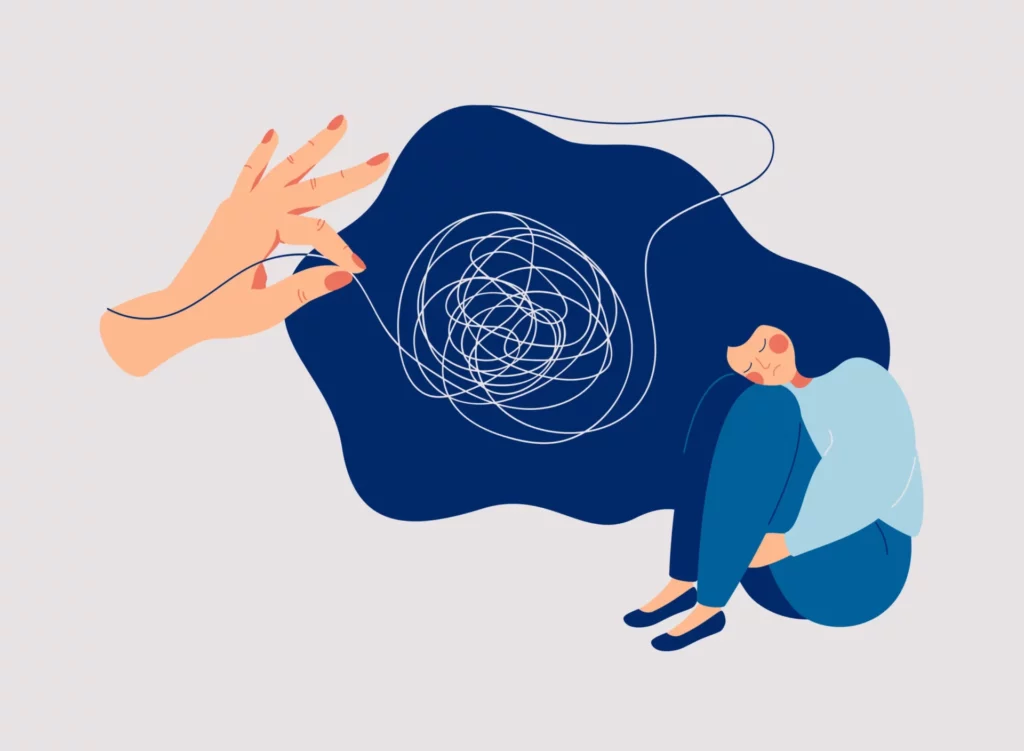Did you know that NAD deficiency is one of the most common nutrient deficiencies in the world? It’s estimated that around 40% of people have low levels of NAD. And what’s even more alarming is that a lot of people who are suffering from depression may actually have low levels of NAD. In this blog post, we will discuss how NAD can help with depression and some things you need to know about it.
Contents
What Is NAD In Depression?
 NAD (Nicotinamide adenine dinucleotide) is an essential enzyme found naturally in all living cells. It plays a role in hundreds of biological processes, including energy production and metabolism. In recent years, NAD has been gaining attention for its potential to treat depression.
NAD (Nicotinamide adenine dinucleotide) is an essential enzyme found naturally in all living cells. It plays a role in hundreds of biological processes, including energy production and metabolism. In recent years, NAD has been gaining attention for its potential to treat depression.
Research suggests that levels of NAD can be low in individuals with depression, which can disrupt the body’s ability to produce energy and neurotransmitters. Studies have shown that NAD levels can be increased through supplementation, leading to an increase in serotonin and dopamine production. In turn, this can improve mood and alleviate symptoms of depression.
How Are NAD And Depression Linked?
it is believed that NAD levels play a role in depression. Research suggests that people with lower NAD levels may be more likely to experience depression. Low levels of NAD can lead to the body not being able to make enough serotonin, which is a neurotransmitter involved in mood regulation. Additionally, NAD plays a role in regulating the stress response and helping to reduce inflammation, both of which have been linked to depression.
Low NAD levels can lead to an increased risk for depression, and this is why many people with depression are encouraged to increase their NAD levels. This can be done through lifestyle changes or by taking supplements that contain NAD precursors.
So, the connection between NAD and depression is complex, but it is clear that NAD levels are important in regulating mood. Therefore, you should always take steps to ensure that your NAD levels are within a healthy range. Doing so can help reduce the risk of depression and improve overall health.
What Are Some NAD Supplements To Help With Depression?
 NAD supplements can play an important role in helping to manage symptoms of depression. Some of the most common NAD supplements used to help with depression include:
NAD supplements can play an important role in helping to manage symptoms of depression. Some of the most common NAD supplements used to help with depression include:
- Vitamin B3 (Niacinamide): Vitamin B3 plays an important role in the production of serotonin, a neurotransmitter that helps regulate mood. Increasing your intake of vitamin B3 can help to balance out your mood and boost overall emotional health.
- Folic Acid: Folic acid is also known as folate or vitamin B9 and helps to increase the levels of serotonin in the brain. In addition, folic acid plays a role in converting homocysteine into methionine which is an important building block for DNA repair and cell growth.
- Vitamin D: Low levels of vitamin D have been linked to symptoms of depression such as feelings of sadness and fatigue. Vitamin D is essential for healthy brain functioning and can help to improve overall mood.
- Omega-3 Fatty Acids: Omega-3 fatty acids are an important part of a balanced diet and have been shown to reduce symptoms of depression. Increasing your intake of omega-3 fatty acids can help to manage the symptoms associated with depression.
- Magnesium: Magnesium is an important mineral for overall health and can help to reduce symptoms of depression. Increasing your intake of magnesium through foods or supplements can help to balance out mood swings, boost energy levels, and improve overall mental health.
In addition, a few other supplements that can help to manage symptoms of depression include 5-HTP, St. Johns Wort, and SAMe. Ultimately, it is important to speak with your doctor before taking any kind of supplement as they will be able to determine the best course of action for you in regard to managing your depression symptoms.
Can You Manage NAD Levels Naturally For Depression?
Though supplements for NAD+ levels are widely available, there are several natural ways to increase them. Here are some ways to do this, depending on the cause of your depression:
- Diet
Eating a balanced diet rich in fruits and vegetables can help ensure adequate levels of NAD+. Additionally, consuming foods high in vitamin B3 and tryptophan, an amino acid found in protein-rich foods like eggs, legumes, and nuts, can also increase levels of NAD+ in the body.
- Exercise
Regular physical activity can help increase energy and endorphin levels, which are both important in managing depression. Additionally, exercise can aid in increasing NAD+ levels by activating sirtuins, proteins that aid in regulating cellular functions and metabolism.
Stress is one of the major contributing factors to depression. Taking steps to reduce stress, such as yoga, deep breathing exercises, and mindfulness meditation can help reduce depressive symptoms as well as increase NAD+ levels.
Ensuring adequate sleep each night is essential in managing depression. Poor sleep can exacerbate symptoms and make it more difficult to cope with the condition. Additionally, lack of sleep will decrease NAD+ levels in the body, which further contributes to depressive symptoms. Getting sufficient restorative sleep each night is important in both treating and preventing depression.
These all are natural ways to manage NAD+ levels and help combat depression. A supplementation is also an option, but it’s important to consult with a healthcare professional before doing so. Additionally, seeking professional treatment can be beneficial in managing depressive symptoms and improving overall well-being.
What Is The Downside Of NAD?
Unfortunately, NAD supplementation can also have some potential side effects. The most common include:
- headaches
- nausea
- abdominal cramps
- diarrhea
In some cases, people have also reported feeling dizzy or lightheaded after taking NAD supplements. If you experience any of these symptoms, it is important to stop taking NAD and seek medical advice.
Long-term use of NAD may also increase the risk of certain health conditions such as heart disease and stroke due to its effects on the body. Additionally, people with existing kidney or liver problems should use NAD supplements with caution as they can make these conditions worse.
What Are The Benefits Of NAD With Depression?
 NAD therapy has been shown to be extremely effective in treating depression. Studies have demonstrated that NAD can reduce symptoms of depression, including:
NAD therapy has been shown to be extremely effective in treating depression. Studies have demonstrated that NAD can reduce symptoms of depression, including:
- Reducing feelings of sadness and hopelessness: The first step in treating depression is recognizing and managing mood symptoms. NAD therapy helps to improve mental clarity, reduce anxiety and stress levels, and promote a sense of well-being.
- Improving concentration and focus: With NAD therapy, you can increase your ability to focus on tasks at hand, allowing you to be more productive. This can help improve your overall quality of life.
- Boosting energy levels: NAD therapy helps to restore normal energy levels and improves the body’s natural ability to heal itself. This can help you feel more energized and motivated, which allows you to engage in activities that bring joy into your life.
- Increasing serotonin levels: Serotonin is a neurotransmitter that helps regulate mood and can help reduce symptoms of depression. NAD therapy has been shown to increase the production of serotonin, leading to an improvement in overall mental health.
- Enhancing physical well-being: NAD therapy also helps to improve physical well-being by reducing inflammation and oxidative stress throughout the body. This can help you feel more relaxed and energized, which can also reduce symptoms of depression.
NAD therapy is a safe and natural treatment option for those suffering from depression and other mental health issues. With NAD therapy, you can experience improved moods, increased energy levels, improved focus and concentration, and overall better physical health.
Conclusion
To conclude, NAD and depression are closely linked. NAD is an enzyme that helps to regulate the metabolism of neurotransmitters and plays a role in mood regulation, which can affect depression. It’s clear that depression and NAD levels are correlated, but more research needs to be done to understand exactly how they interact.
Until then, it’s best to take steps toward maintaining a healthy lifestyle. And avoiding any substances that could interfere with NAD levels. Additionally, discuss treatment options with a qualified healthcare professional to determine if NAD supplementation is right for you.
For more information, please contact MantraCare. Depression is a mental illness characterized by persistent feelings of sadness, hopelessness, and loss of interest in daily activities. If you have any queries regarding Online Depression Counseling experienced therapists at MantraCare can help: Book a trial Depression Therapy session


